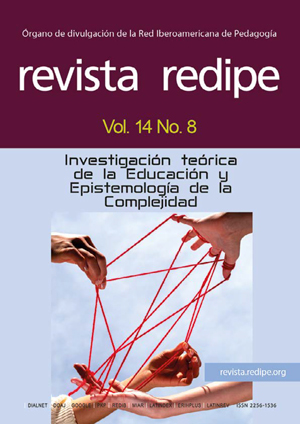Education for intercultural world citizenship: Literature review
Main Article Content
Keywords
Citizenship education, Intercultural education, Global citizenship, Leadership
Abstract
This review guided by the question: what are the conceptual features of intercultural global citizenship education? sought to identify the characteristics of different conceptual foci in two temporal ranges 2000-2015 and 2016-2020.
Methodologically, it was developed through a bibliometric analysis. This analysis followed a longitudinal modeling focused on keywords. Six databases were consulted and the searches were filtered with inclusion and exclusion criteria. The software JabRef for data normalization and SciMat for bibliometric analysis were combined in this exercise.
Conceptual foci (clusters) were consolidated in the time ranges, which show dominant trends in the set of documents analyzed. In the first time range, Global Citizenship, Human, and Intercultural education emerge. In the second, Leadership, Intercultural competence, Digital Education and Education system emerge. The linkages that give weight to each cluster, evidence the research accents on the conceptual field. The transformations and trends identified in each of the analyzed time ranges outline significant changes and influences, related to the disappearance of human as a key word, the blurring of the local and the predominance of intercultural competence.
References
Aguilar, N. y Velásquez, A. M. (2018). Educación para la ciudadanía mundial en Colombia: Oportunidades y desafíos TT - Education for Global Citizenship in Colombia: Opportunities and Challenges. Revista mexicana de investigación educativa, 23(78), 937-961. http://www.scielo.org.mx/ scielo.php?script=sci_arttext&pid=S1405- 66662018000300937&lang=es
Aktas, F., Pitts, K., Richards, J. C. y Silova, I. (2017). Institutionalizing Global Citizenship: A Critical Analysis of Higher Education Programs and Curricula. Journal of Studies in International Education, 21(1), 65-80. https://doi. org/10.1177/1028315316669815
Alonso, S., Cabrerizo, F. J., Herrera-Viedma, E. y Herrera, F. (2009). h-Index: A review focused in its variants, computation and standardization for different scientific fields. Journal of Informetrics, 3(4), 273-289. https://doi.org/https://doi.org/10.1016/j. joi.2009.04.001
Andreotti, V. (2011). (Towards) decoloniality and diversality in global citizenship education. Globalisation, Societies and Education, 9(3-4), 381-397. https://doi.org/10.1080/14 767724.2011.605323
Andreotti, V. de O. y Pashby, K. (2013). Digital Democracy and Global Citizenship Education: Mutually Compatible or Mutually Complicit? Educational Forum, 77(4), 422- 437. https://doi.org/10.1080/00131725.201 3.822043
Bai, H., Eppert, C., Scott, C., Tait, S. y Nguyen, T. (2015). Towards Intercultural Philosophy of Education. Studies in Philosophy and Education, 34(6), 635-649. https://doi. org/10.1007/s11217-014-9444-1
Boni, A. (2011). Educación para la Ciudadanía Global Significados y Prácticas para un Cosmopolitismo Transformador. Revista española de educación comparada, 17(22), 65-86. https://dialnet.unirioja.es/ servlet/articulo?codigo=3646631
Boqué, M. C., Pañellas, M., Alguacil, M. y García, L. (2014). La cultura de paz en la educación para la ciudadanía y los derechos humanos en los libros de texto de educación primaria TT - The culture of peace in education for citizenship and human rights in primary education textbooks. Perfiles educativos, 36(146), 80-97. http://www.scielo.org.mx/ scielo.php?script=sci_arttext&pid=S0185- 26982014000400006&lang=es
Byram, M. (2008). From foreign language education to education for intercultural citizenship: Essays and reflections. En From Foreign Language Education to Education for Intercultural Citizenship: Essays and Reflections. Channel View Publications. https://www.scopus.com/inward/record. uri?eid=2-s2.0-84948990395&partnerI D=40&md5=19a890e72ac641af0eb7ee 1b62983470
Byram, M. (2013). Foreign language teaching and intercultural citizenship. Iranian Journal of Language Teaching Research, 1(3), 53-62. https://www.scopus.com/inward/ record.uri?eid=2-s2.0-84923015968&part nerID=40&md5=a07bc380e0944b5d0c8ac 7ad45f0969e
Byram, M. y Wagner, M. (2018). Making a difference: Language teaching for intercultural and international dialogue. Foreing Langueje Annals, 51(1), 140-151. https://doi.org/10.1111/flan.12319
Campbell, C. y Walta, C. (2015). Maximising intercultural learning in short term international placements: Findings associated with orientation programs, guided reflection and immersion. Australian Journal of Teacher Education, 40(10), 1-15. https://doi.org/10.14221/ ajte.2015v40n10.1
Carneiro, R. (2013). Living by learning, learning by living: The quest for meaning. International Review of Education, 59(3), 353-372. https://doi.org/10.1007/s11159- 013-9355-3
Caruana, V. (2014). Re-thinking global citizenship in higher education: From cosmopolitanism and international mobility to cosmopolitanisation, resilience and resilient thinking. Higher Education Quarterly, 68(1), 85-104. https://doi. org/10.1111/hequ.12030
Cobo, M. J., López, A. G., Herrera, E. y Herrera, F. (2011). An approach for detecting, quantifying, and visualizing the evolution of a research field: A practical application to the Fuzzy Sets Theory field. Journal of Informetrics, 5(1), 146-166. https://doi. org/10.1016/j.joi.2010.10.002
Cobo, M. J., López, A. G., Herrera, E. y Herrera, F. (2012). SciMAT: A new science mapping analysis software tool. Journal of the American Society for Information Science and Technology, 63(8), 1609-1630. https:// doi.org/https://doi.org/10.1002/asi.22688



